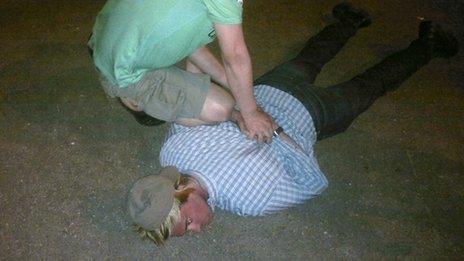HMP Hewell: Prison chess clubs helping rehabilitate inmates
- Published
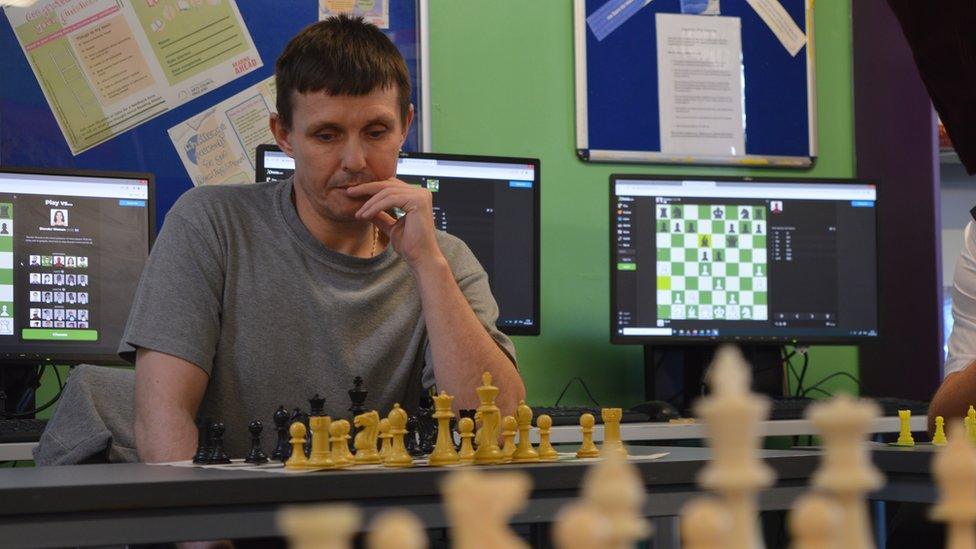
Prisoners at HMP Hewell have the opportunity to take part in a chess club
Chess is helping a growing number of prisoners learn a variety of skills while serving their sentences - including patience and perseverance. The BBC went to see how the game is benefitting inmates at a jail in Worcestershire.
As I walk into HMP Hewell, I watch in silence as five prisoners come under a brutal attack. Two guards are also being assaulted from every direction until they too are forced to retreat.
I stand watching wave after wave of punishment, and I fear for them all. Then, all of a sudden everything stops.
The room falls quiet and the tall slim man who has inflicted all of the damage, says "check".
Carl Portman is teaching chess.
Standing thoughtfully within a square made up of black and white boards he slowly spins - playing each of his nine opponents in turn.
"Chess is beautiful and brutal, just like life," says the teacher, who is part of the English Chess Federation.
"The reason why people are in prisons is because they didn't think before they made a move. In chess you have to think before you move."
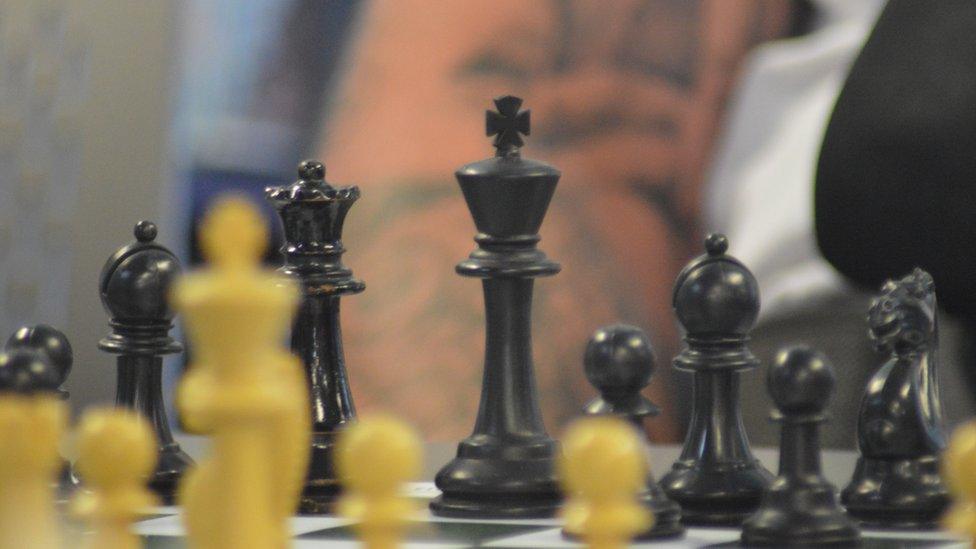
Some prisoners describe playing the game helps them relax
Having played for his country, Mr Portman, from Oxfordshire, has spent the last decade teaching the games in prisons where in recent years one of the world's oldest games has blossomed behind bars.
HMP Hewell, near Redditch in Worcestershire, is home to more than 1,000 male inmates. Justin is one of them, sitting arms crossed and deep in thought, he stares at the board.
"In most jails, you spend a lot of your time behind your door," he says. "Chess is good for my mental health, it's something to concentrate on.
"I think of it like a battlefield, but on a board. I'm going to war and it's nice to have strategy."
The UK's only charity to organise chess in prisons held its first match within the walls of HMP Isis in London in 2018.
While their entry was prohibited by lockdown, Chess in Schools and Communities now works with 16 prisons and says applications continue to rise.
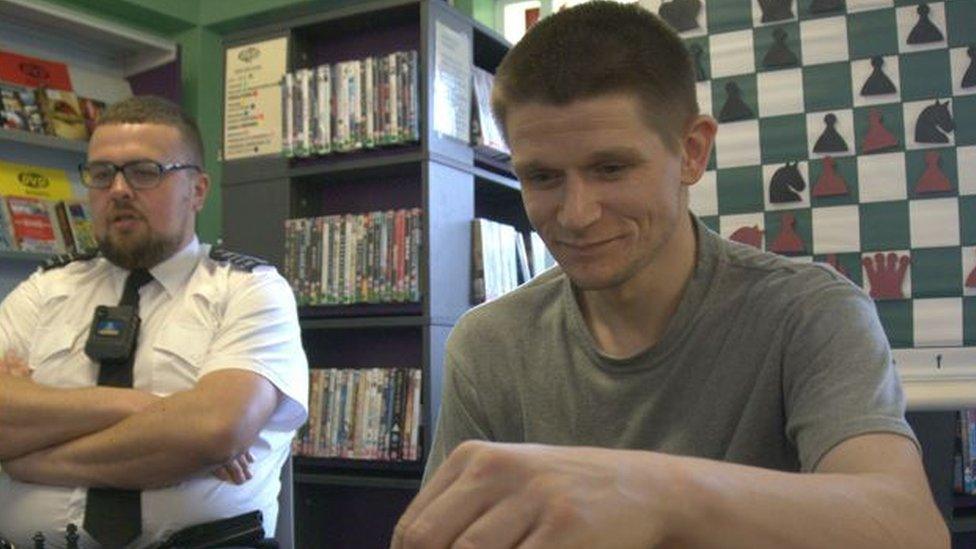
Prisoners like Nathan learn "transferrable skills" through chess, says the Ministry of Justice
The man in charge of HMP Hewell watches on as Mr Portman slides a white bishop across the board, putting a prison officer in check.
Governor Ralph Lubkowski spent 18 months at HMP Stafford where staff ran a chess club with 40 players and says it was something he was keen to replicate at Hewell.
"When the men come into custody, to some extent they've lost everything, so how do you start to rebuild that?" he says.
"There's no doubt in my mind that chess can be a part of it, and we've seen so many examples of where the men have flourished and thrived. Officers can play against prisoners, it breaks down barriers," he adds.
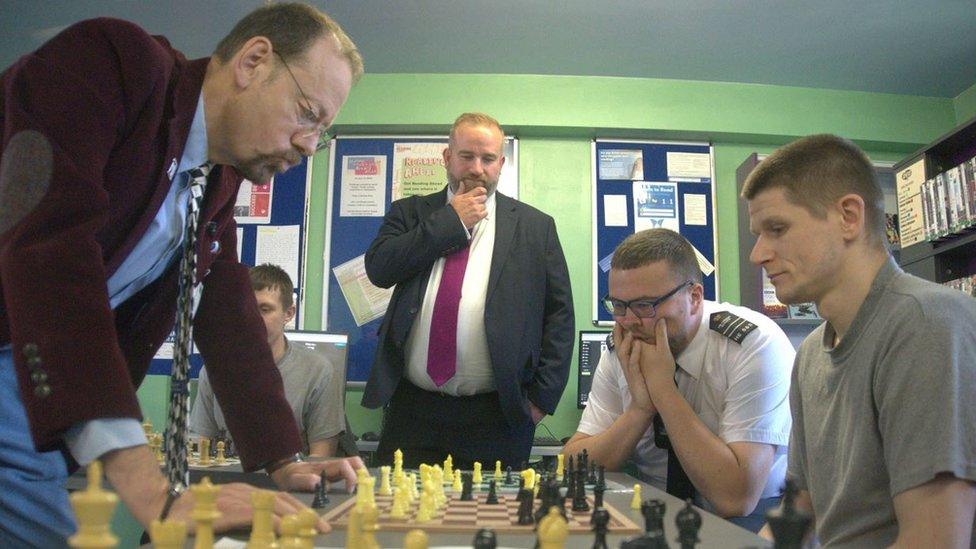
Teacher Carl Portman plays opponents while prison governor Ralph Lubkowski and staff look on
The Ministry of Justice says chess trains players to think before they act and provides transferrable skills that can help them find a job so they don't commit further crimes when released.
A recent documentary series, Through the Mirror of Chess: A Cultural Exploration, examines the game's impact on culture, art, science and sport.
Filmmaker Howard Burton said under the right circumstances, the game has "considerable social benefit" to a large number of people.
Meanwhile, back at the prison, Nathan sits back in his chair, thoughtfully hovering a black knight just above the board.
He is back in prison after spending time inside over Christmas and says chess is helping him get back to who he was.
"I lost my way in life," he said. "I had my reasons.
"Playing chess is part of normal life, so if you lose your way out there, in here, doing this, can make you feel like you're normal, and not a criminal."
Last October, HMP Hewell represented England in an annual prison tournament held online, playing inmates in 45 other countries.
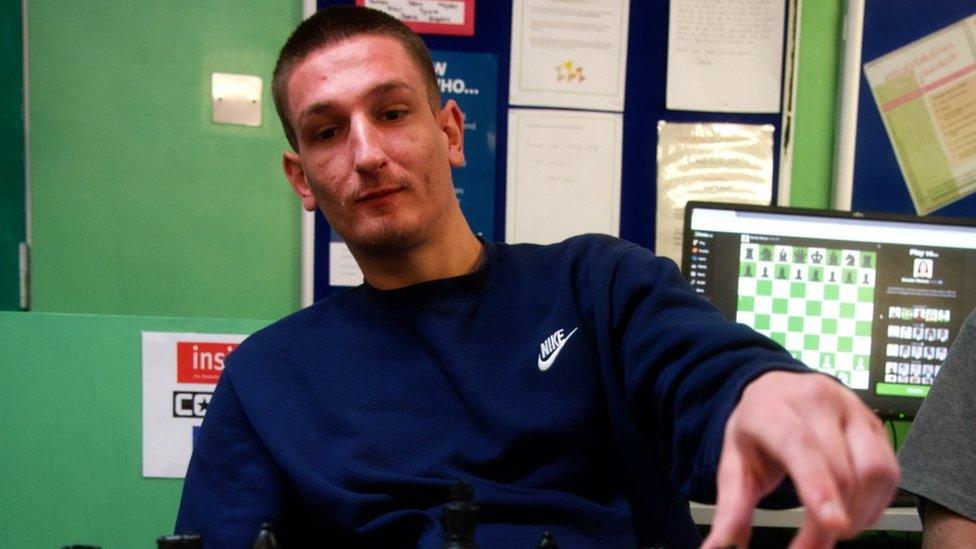
Joshua hopes to represent his country in the next international prison chess tournament
The men's competition was won by The Philippines, while Mongolia's female prisoners beat Serbia to claim gold.
New York-based charity The Gift of Chess works within the US prison system.
Founder Russell Makofsky says there has been an increase in public awareness and conversations surrounding the benefit of chess for those in prison.
This has led, he says, to expanded programming, playing and resource opportunities for those incarcerated.
At HMP Hewell another king has been captured, the room begins to empty as beaten players leave the board and return to their cell.
Carl, the man in the middle, remains focused and still offering advice as he prepares to dispatch the last of today's opponents.
'You feel like you're out of jail'
One of the last few remaining is Joshua, who says even in defeat, today has helped to relax his mind as he awaits his prison sentence.
"You feel like you're out of jail when you're playing a game - you're focused on that, it just takes you out of the environment," he explains.
"I come up here on Tuesday mornings and play with the staff, it's something to look forward to.
"I think they are trying to sort out for me to play in the next international tournament - it would be good to represent England and do my part."

Follow BBC West Midlands on Facebook, external, Twitter, external and Instagram, external. Send your story ideas to: newsonline.westmidlands@bbc.co.uk, external
- Published15 May 2013
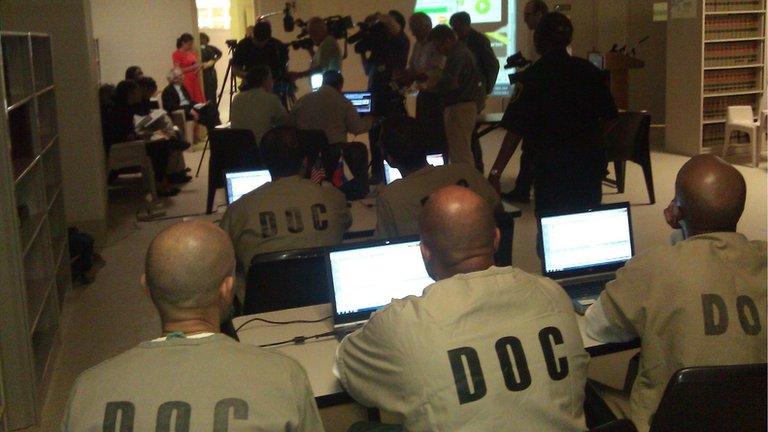
- Published15 May 2013
